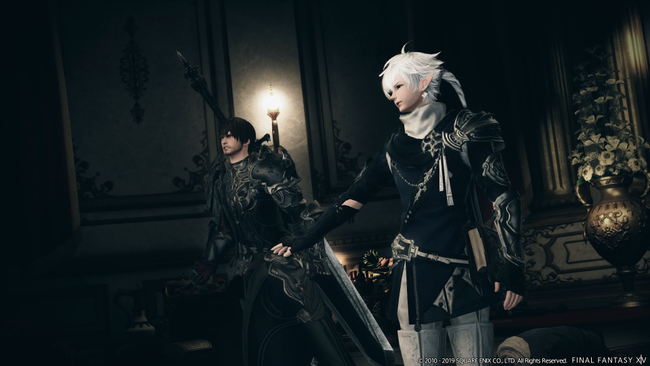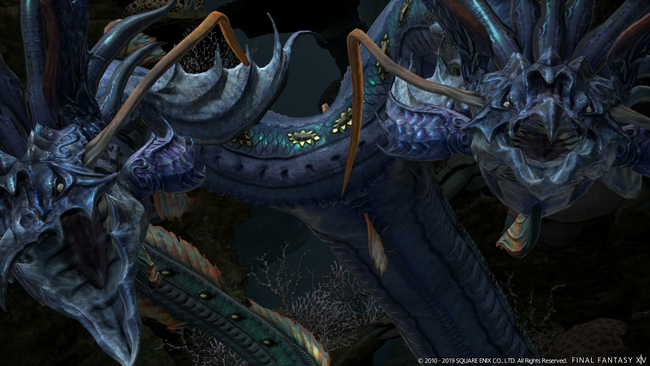
Final Fantasy XIV Interview: Sitting down with Naoki Yoshida and Banri Oda
Final Fantasy XIV: Shadowbringers released just a few months ago to unanimous praise, and at Gamescom 2019 we were lucky enough to be able to talk, through a translator, with Director & Producer, Naoki Yoshida, and main scenario writer, Banri Oda, about various elements of this highly acclaimed MMORPG. While our review is currently on-going, we were able to get a glimpse at how some of the fights for the Eden raids were designed and ask some questions about some community issues.
RPG Site: There are a lot of homages to previous Final Fantasy titles in Shadowbringers, specifically the jesters from Final Fantasy IX, the sin eaters being reminiscent of the sin spawn from Final Fantasy X, and Zodiark and the names of the Ascians being derived from Final Fantasy XII, were there any narrative elements you included from other Final Fantasy titles you felt enhanced the narrative of this expansion?
Oda: So there are actually several essences to using homages from Final Fantasy legacy titles. The first thing is that when the team decided to rebuild Final Fantasy XIV from the original 1.0, we received a lot of feedback from players saying that it didn't feel like a Final Fantasy title. What was important for us, an an MMORPG, is a strong community and strong player-base so we wanted to encourage conversation among players because not everyone has played all of the legacy Final Fantasy titles and by giving Final Fantasy XIV this essence we wanted to give them an opportunity to talk about whether or not they played the games and we wanted this to integrate together.
I want to say it's not the case that we just want to throw in any ideas or essence from the legacy titles, because I am a fan of the Final Fantasy series and I have played everything, I think that protecting the memories you had through playing the game is really important. Also, because not everyone has played the previous Final Fantasy titles the story-line for Final Fantasy XIV has to be digestible to everyone.
Yoshida: Final Fantasy XIV has a story of its own, that being said we have this sort of concept of XIV to be the theme-park for the Final Fantasy series. We wanted to make it a platform that people from any generation or background could get together and share the same universe so we are doing this deliberately. We also wanted to incorporate indirect elements that would give that sort of punch, the story of Final Fantasy XIV is the core of Final Fantasy XIV so just because we have these elements these are not the main focus.
RPG Site: The Eden content is some of the most exhilarating raid material thus far - how did you approach expanding already familiar mechanics in these fights that were present in A Realm Reborn with Leviathan and Titan for these new raids?
Yoshida: We didn't want to make the mechanics completely different from the original fights. Taking Bahamut Prime for example when we created this fight we tried to research everything - what kind of attacks this enemy has and what kind of additions we should make to make sure players recognize this as Bahamut. So we do very thorough research before creating the encounter. Still keeping the legacy mechanics and attack as part of the creation, the designers thought of more ideas to keep Final Fantasy XIV's Bahamut special, along with the other Primals.
They would decide of an attack should share damage with players or if the Primal would crush the plate and the players would fall off of the cliff. This is done for every Primal encounter in Final Fantasy XIV to retain the basic flow. These Primals appeared for A Realm Reborn - specifically Leviathan and Titan - so those designers that created the versions present in Eden they researched the original mechanics those Primals had and tweaked and rearranged them in their own way to bring more excitement to the fight and to the players. This was how Eden's Leviathan and Titan came about. By taking the A Realm Reborn Primals by reference we made something new out of original content.
RPG Site: Final Fantasy XIV seems to draw inspiration to real-world parallels to politics and history, with Ishgard primarily being a theocracy and the possibility of Amaurot being read as a criticism of the Japanese bureaucratic systems inability to respond to natural disasters. Was this intentional, and if so what message would you like to leave the players with regarding the politics of this game?
Oda: Rather than taking inspiration from current affairs and government systems, I am a big fan of history so I take some inspiration from history books. Even though I am a fan of past games from the Super Nintendo era, the main demographic for Final Fantasy XIV is in their 20s or 30s, so I wanted to put something mature in nature to make it interesting for them. You used the Japanese government's handling of natural disasters as an example, that wasn't a reference for Amaurot, so there isn't a link to real-life politics.
Yoshida: Being in charge of Final Fantasy XIV as both Producer and Director, I'm forty-six years old, but I've also been a gamer since I was a child. I would sometimes get emotional or get inspired by those titles I played as a child. But what's important is if I play these games again, that I still feel the same way or am moved by the same things. Speaking of people, there is always a good and bad side of them, but everyone comes from different backgrounds. And because of these different backgrounds, beliefs and religions can be different, this often leads to fighting and conflict. This makes real-life complicated and I wanted to bring this into the game to reflect this essence and to make it more realistic.

Oda: Final Fantasy XIV's approach to reflecting real-world issues is influenced by Tactics Ogre. There is an element of massacre there, and if I didn't play this game the approach to Final Fantasy XIV's story would have been different. Tactics Ogre has a story that includes ethnic cleansing that greatly influenced my desire to reflect real-life conflicts and issues to make Final Fantasy XIV more realistic.
Yoshida: Any antagonist for Final Fantasy XIV will have their own background and reasoning. We don't have any intention to have shallow or hollow antagonists.
RPG Site: Recently there was an outfit (Taisho Roman Attire) released to both the Chinese and Global Servers that Korean community members have pointed out as being reminiscent of clothing worn during the Japanese occupation of South Korea, which resulted in an online petition being posted on Change.org from various users requesting Square Enix remove the outfit out of sensitivity to wartime events. Is there any comment you would like to make regarding this?
Yoshida: I would like to explain it bit by bit, so everything can be explained completely. The concept of this outfit came from the Korean and Chinese publishers, they gave the development team in Japan the suggestion to create this outfit, the request came from them. Regardless of the historical background, they requested this specific design. The team in Japan already understood that this would be quite contentious and that there would be people voicing their concerns because this is quite sensitive. We do know that there is a historical background attached to this, and we tried to mitigate, to not evoke the history of what happened before. This is why we tried to give it a neutral name that wouldn't evoke a negative historical understanding to protect the community.
When this outfit was complete and ready for release, the Chinese team made an announcement with flavor text regarding it being reminiscent of the Japanese occupation. This is because the Chinese team underestimated that there would be a particular amount of people in South Korea that would take it personally. That said the team in Japan didn't know that the Chinese team announced the outfit with this flavor text - it was out of our hands and out of our control. We were very careful when creating this design, however, since it could be very risky.
We just want to reiterate that the team in Japan have no particular view or thoughts on certain historical events. Because of this, the team was discussing that this may not be a good idea to release this to the Korean version of the game, but there are also so many people in South Korea who want this outfit and we received many messages from the customer service team about this as well. Because of this we decided that we should admit and apologize for this mistake the Chinese team made, but because there are so many people who are after this outfit regardless of region we made the decision to release it.
